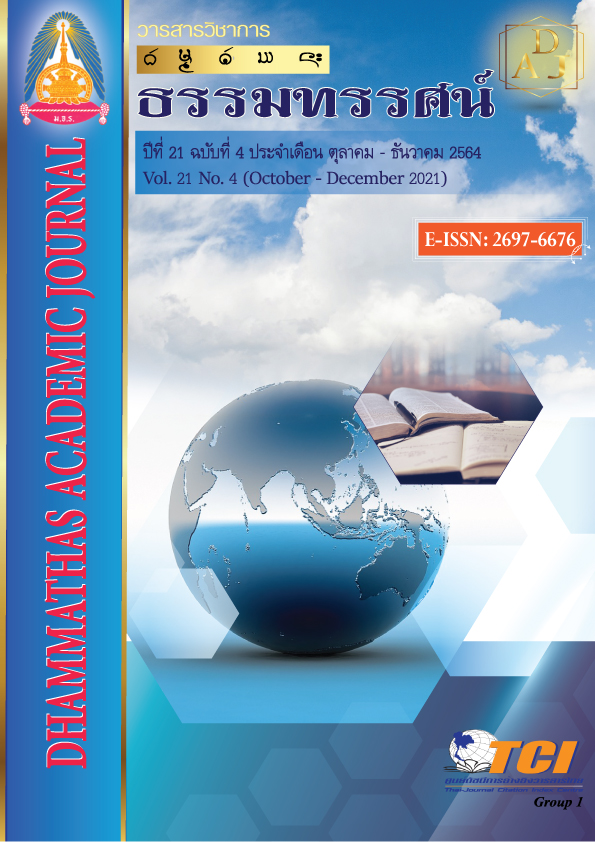The Development of Enhancing Public Mind Characteristic Activities for Fourth Grade Students
Main Article Content
Abstract
The objectives of this research were: 1) to develop activities to enhance public mind characteristics for grade 4 students, 2) to compare public mind characteristics of grade 4 students between pre-implementation and post-implementation of public mind promoting activities. The samples used in this research were 15 grade 4 students who enrolled in the second semester of the academic year 2020 at Ban Pa Daeng School (Wan Rattawittaya), Mueang Phrae District, Phrae Province, The tools used for data collection were public mind promoting activities for elementary school students and two evaluation forms of public mind characteristics: a behavioral assessment form and situational measure. Results were analyzed using statistics including t-test for Dependent Sample, mean and percentage of growth.
The results was found:
1. The activities to enhance the public mind that the researcher developed consisted of 4 activities, were Activity 1: Dreaming Classroom, Activity 2: White School, Activity 3: Community Unity, and Activity 4 the Solving of Garbage Problems in Schools. All activities focused on 5 stages: 1 stage of perception, 2 stages of response, 3 stages of appreciation, 4 stages of organization, 5 stages of habitual behavior. The average of index of item objective congruence (IOC) is between 0.67 to 1.00.
2. The students in grade4 were organized activities with public mind attributes. After the activity was significantly higher than before the activity was statistically.
Article Details
References
จิตรลดา ทองอันตัง และคณะ. (2559). การพัฒนารูปแบบการจัดการเรียนรู้วิทยาศาสตร์ตาม แนวคิดการเรียนรู้โดยการรับใช้สังคมร่วมกับแนวคิดการเรียนรู้เชิงสถานการณ์เพื่อ เสริมสร้างจิตสาธารณะความสามารถในการถ่ายโยงการเรียนรู้และผลสัมฤทธิ์ทางการเรียนสำหรับนักเรียนชั้นประถมศึกษาปีที่ 5. วารสารวิชาการมหาวิทยาลัยราชภัฏภูเก็ต, 12(2), 26-56.
จุฑาพร นาครอด. (2554). ปัจจัยเชิงสาเหตุทส่งผลต่อการมีจิตสาธารณะของนักเรียนชั้นมัธยมศึกษาปีที่ 2 ในเขตพื้นที่การศึกษากรุงเทพมหานคร. (วิทยานิพนธ์การศึกษามหาบัณฑิต). กรุงเทพฯ: มหาวิทยาลัยศรีนครินทรวิโรฒประสานมิตร.
ชัยวัฒน์ สุทธิรัตน์. (2552). ความหมายของจิตสาธารณะ. เข้าถึงได้จาก http://www.etheses.rbru.ac.th/pdf-uploads/thesis-228-file06-2017-02-17-10-31-27.pdf
_______. (2553). สอนเด็กให้มีจิตสาธารณะ. กรุงเทพฯ: วีพรินท์ (1991) จํากัด.
ทิศนา แขมมณี. (2550). การพัฒนาคุณธรรม จริยธรรม และค่านิยม: ทฤษฎีสู่การปฏิบัติ. กรุงเทพฯ: เมธีทิปส์.
ธิดาชนก วงค์พิทักษ์. (2556). ปัจจัยจิตสังคมที่ส่งผลต่อพฤติกรรมจิตอาสาของนิสิตมหาวิทยาลัยศรีนครินทรวิโรฒประสานมิตร. (วิทยานิพนธ์การศึกษามหาบัณฑิต). กรุงเทพฯ: มหาวิทยาลัยศรีนครินทรวิโรฒประสานมิตร.
นิรมล มาลัย. (2554). จิตสาธารณะและผลสัมฤทธิ์ทางการเรียนวิทยาศาสตร์ เรื่องสิ่งมีชีวิตกับสิ่งแวดล้อมของนักเรียนชั้นประถมศึกษาปีที่ 6 ที่สอนโดยการเสริมสร้างกิจกรรมพัฒนาจิตสาธารณะ. (วิทยานิพนธ์ศึกษาศาสตรมหาบัณฑิต). เชียงใหม่: มหาวิทยาลัยเชียงใหม่.
เพ็ญฏระการ ดามัน. (2559). ผลการจัดการเรียนรู้ตามแนวคิดวิทยาศาสตร์ เทคโนโลยี และสังคมที่มีต่อจิตสาธารณะและผลสัมฤทธิ์ทางการเรียนวิชาวิทยาศาสตร์ของนักเรียนชั้นประถมศึกษาปีที่ 6. (วิทยานิพนธ์ศึกษาศาสตรมหาบัณฑิต). เชียงใหม่: มหาวิทยาลัยเชียงใหม่.
วิจารณ์ พาณิช. (2555). วิถีสร้างการเรียนรู้เพื่อศิษย์ในศตวรรษที่ 21. กรุงเทพฯ: มูลนิธิสดศรี สฤษดิ์วงศ์.
สมปอง ช่วยพรม และวารีรัตน์ แก้วอุไร. (2559). การพัฒนารูปแบบกิจกรรมเสริมสร้างจิตสาธารณะตาม หลักการเรียนรู้แบบรับใช้สังคมสำหรับนักเรียนระดับประถมศึกษา. วารสารมหาวิทยาลัยราชภัฏลําปาง, 5(2), 133-146.
อัญชลิกา ผิวเพชร. (2555). ปัจจัยเชิงสาเหตุที่มีอิทธิพลต่อจิตสาธารณะของนักเรียนชั้นมัธยมศึกษาปีที่ 4 ในเขตภาคตะวันออกเฉียงเหนือตอนบน. (วิทยานิพนธ์การศึกษามหาบัณฑิต). มหาสารคาม: มหาวิทยาลัยมหาสารคาม.

